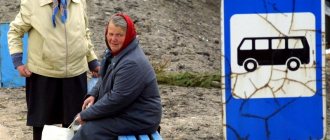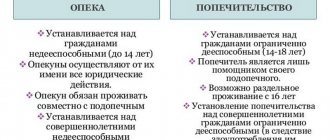- home
- Reference
- Privileges
Recipients of pension benefits who live in the northern regions, when changing their address of residence, have the right to receive reimbursement of costs related to the payment of relocation from the Far North.
The right of such citizens to reimbursement of expenses incurred during relocation is provided for by Government Decree No. 1351 of December 11, 2014.
- 3.1 Collection of documents
Who is entitled to compensation?
The above resolution establishes the following conditions that give Russians the opportunity to receive compensation:
- Registration in the northern region . Only those citizens who have permanent registration in the northern region or in territories that are equivalent to such can reimburse expenses.
- Moving to a new address in another region . The Pension Fund reimburses costs only to those citizens who move from the northern regions to a new address in regions not considered the Far North. For example, a pensioner will not be able to reimburse the costs associated with moving from Sakhalin to Kamchatka. In addition, the Pension Fund does not reimburse costs related to the relocation of a Russian to the regions of the Far North, for example, from Omsk to Arkhangelsk.
- An unemployed citizen changes his place of residence . Only those citizens who are not working at the time of changing their place of residence have the opportunity to receive financial compensation for moving costs. The period during which the Russian has not worked does not matter. The costs can be reimbursed both by pensioners who stopped working immediately after receiving their pension, and by people who terminated their employment relationship with their employer before moving. Working pensioners are not entitled to compensation.
Recipients of both insurance and state pensions can apply for compensation:
- Russians who have been assigned a pension based on age, length of service, and pension coefficients;
- people with disabilities who have worked for at least 1 day;
- former military, civil servants;
- participants of the Great Patriotic War and Chernobyl survivors who are disabled;
- Russians receiving state pensions for the loss of a breadwinner.
Worker's compensation
Article 169 of the Labor Code of the Russian Federation establishes the following mandatory compensation:
- expenses for moving the employee, members of his family and transporting property (except for cases where the employer provides the employee with appropriate means of transportation);
- expenses for settling into a new place of residence.
The accountant has no questions regarding moving expenses. But what are the costs of arrangement?
We did not find an answer to this question in regulatory documents or court decisions. In the absence of other sources, we will find out what is meant by such expenses for a federal government employee. According to subparagraph “e” of paragraph 2 of the “Rules for reimbursement of expenses associated with the relocation of a federal civil servant...” (approved by Decree of the Government of the Russian Federation of August 11, 2007 No. 514), expenses for arrangement at a new place of residence are reimbursed based on:
- for a civil servant - 2.5 monthly salary of a civil servant in accordance with the position he fills at the new place of duty;
- for a spouse - 1.5 of the specified salary of a civil servant;
- for each moving family member - 1 specified salary of a civil servant.
By the way, the amounts are considerable! As for the costs of renting living quarters for civil servants and members of his family, they are reimbursed only in the event of an involuntary delay along the route.
This example shows that the costs of arrangement are not detailed and are not reduced to the employee’s expenses for hiring a living space. Exactly how the employee uses the funds allocated to him is not the employer’s concern and the employee is not required to report on this. And he can immediately buy housing or live with relatives.
Similarly, these issues are resolved in relation to employees of the Investigative Committee of the Russian Federation (Resolution of the Government of the Russian Federation dated July 7, 2011 No. 542). Thus, the Government of the Russian Federation, as the supreme executive body, does not consider it advisable to regulate the composition of expenses for development.
note
A preliminary agreement between the employer and employee regarding the latter’s move to work in another area must be formalized in writing. At the same time, we recommend agreeing on the procedure for returning compensation payments for relocation in the event of termination of the employment contract.
Reimbursable expenses for renting residential premises are expressly stipulated in labor legislation (Article 168 and Article 168.1 of the Labor Code of the Russian Federation). For this reason, excessive detailing of development costs can lead to tax disputes. The wording of the Labor Code should not be distorted or supplemented.
How much is compensation for leaving for a new place of residence?
Reimbursement for the costs of moving a citizen from the northern regions to a new address is carried out in accordance with the actual costs incurred for:
- transportation of a citizen and his relatives;
- transportation of things whose total weight does not exceed 5 tons per family;
- preparation of travel documents.
The amount of actual costs should not be greater than the price of travel on the shortest or direct route.
Directions
A citizen has the right to receive compensation for moving the following types of vehicles:
- Trains . When changing place of residence, a citizen has the right to use railway transport of any category. You can travel on branded trains only if it is not possible to travel on trains of other categories.
- Water vehicles . You can travel by water transport in 3rd class cabins (inland water vehicles and transport line ships).
- Airplanes . In a situation where in the city from which a citizen is moving there is no possibility of using water vehicles or trains, the Russian has the right to use air transport services (flight in an economy class cabin). Reimbursement of flight costs is also carried out if the price of the flight to the destination is less than the average price of travel by train, bus, or water vehicle.
- Cars . A citizen has the right to move in his own car. In such a situation, the state compensates for fuel costs that were actually incurred by the citizen when moving. The maximum amount of compensation is established taking into account the basic norms of fuel costs, which are approved by the Ministry of Transport of Russia.
Delivery of things
The state provides compensation for moving from the far north to pensioners, as well as the cost of transporting luggage. A pensioner can also receive reimbursement for expenses associated with the relocation of his family members.
The following relatives of a citizen can compensate for the costs:
- husband/wife who was declared unable to work due to age or disability;
- minor sons/daughters;
- minor brothers/sisters, grandchildren/granddaughters who do not have able-bodied guardians and are dependents of a citizen;
- adult sons/daughters, grandchildren/granddaughters, brothers/sisters who are disabled from childhood.
Also, a Russian has the right to reimburse the costs of moving children aged 18-23 years studying full-time at an educational organization.
The procedure for compensating expenses for moving from the Far North has been updated
Applicants may be pension recipients who do not work under employment contracts, do not receive remuneration under certain civil contracts and do not engage in other activities during which they are subject to compulsory pension insurance.
From Yakutia, holders of state housing certificates travel mainly to regions with a mild climate, although there are also those who go to the hot south to “warm up” - to Sochi and Krasnodar. Many people want to settle closer to Moscow and St. Petersburg. Over the decades, a fairly large Yakut diaspora has formed in St. Petersburg. This is due not least to the fact that the city is located almost at the same latitude as Yakutsk, and people find themselves in almost the same North, only much more comfortable and warm. And one of the most attractive places is Belgorod.
“The nature here is wonderful, prices for everything are significantly lower than in Yakutia. We can live with our pensions, we are only nostalgic for northern fish. There’s already a whole block of ours here, and we periodically meet new fellow countrymen,” said settler Vladimir Ikonnikov.
According to him, Yakut residents do not experience any particular problems with settling in their new place. People, as a rule, do not come at random, but at the invitation of friends who have settled here before, and they help the newcomers get comfortable.
But getting a housing certificate is a big problem. About 26.4 thousand people are on the waiting list to move to Yakutia. More than 19.5 thousand of them are first-priority workers, disabled people and non-working pensioners. Moreover, last year 145 million rubles were allocated to the region for the implementation of the program. This money was enough for 74 certificates. This year the republic received 297 million for 135 families. According to State Duma deputy from Yakutia Galina Danchikova, at this rate, it will be possible to provide housing for all those on the waiting list only in 100 years.
The Ministry of Construction of the Komi Republic has published a consolidated list of citizens who will receive certificates for moving from the Far North and equivalent areas in 2021; there are 298 of them. They are included in the list by category: disabled people of groups I and II, disabled since childhood and pensioners from Vorkuta, Inta, Ukhta, Usinsk, Sosnogorsky, Pechora, Troitsko-Pechora, Udora, Ust-Tsilemsky, Vuktylsky and Izhemsky districts. For this purpose, 633 million rubles have been allocated. Extracts from the general list of recipients were sent to municipal administrations to organize work with citizens to collect the necessary documents. Lists are formed by the date of registration.
In the Komi Republic, certificates are issued annually for the resettlement of people from the Far North and equivalent areas. In total, 28 thousand families are on the waiting list. Most of them are pensioners, 62% of them, working people - 29% and disabled people - 9%. On average, 320 certificates are issued. Residents of coal cities - Vorkuta and Inta - receive more often. Most leave for Moscow, the Moscow region and St. Petersburg.
Over the past nine years, certificates worth 7.1 billion rubles have been issued in Komi, 600-650 million annually. To resettle all the residents of the Komi Republic standing in line, it is necessary to spend at least three billion every year. But there is no such money. And the provided amount of funding does not allow us to quickly solve the problem.
In the Nenets Autonomous Okrug, the waiting list for relocation to warmer climes numbers about five thousand people. It consists of three categories: disabled people, pensioners (the most of them) and simply working residents of the Nenets Autonomous Okrug who want to move. However, the resettlement program from the Far North is stalled, and the queue is moving extremely slowly. The main problem is lack of funding. In 2019, only sixteen families in the district will receive housing certificates for the purchase of apartments in other regions, and about three hundred applicants for this year.
To get things moving, the Nenets Autonomous Okrug is considering the option of the district itself constructing housing for displaced people in other regions.
In addition, they will be helped through another program - for the resettlement of emergency housing. The county provides residents of dilapidated buildings with compensation to purchase normal apartments. At the same time, there are no geographical restrictions - housing can be purchased anywhere in the country. And recently this procedure was made even simpler by relaxing the requirements for choosing a home. Most often, residents of the Nenets Autonomous Okrug move to St. Petersburg and the Leningrad region.
The area of Yamal is the size of France and a half, but only half a million people live here. Of these, only every tenth is a representative of the indigenous people - the Nenets, Khanty and Mansi, the rest are those who came to develop these lands, extract oil and gas, or their descendants. Over the years, some of them have become accustomed to the harsh living conditions, when the temperature drops below 50 degrees, and even with the wind, and have adapted to the dead polar night in winter and the polar day in summer. But part of the population, as soon as possible, strive to move to the “mainland”. As the regional government notes, the numbers leaving Yamal under the resettlement program vary from 1 to 12 thousand people from year to year, but in any case, no more than one or two percent of the total number leaves the district annually. The reason is not only that people have become attached to these regions over many years, but Yamal has one of the highest salaries in the country. Yamal comes second after the Nenets District in terms of average salary: today in this region it has reached 102 thousand rubles. It turns out that you will think a hundred times whether to move or not.
In addition to the federal state program for resettlement to any region of Russia, there is also a special regional program “Cooperation”. According to it, residents of Yamal can move to the south of the Tyumen region. At the same time, you can also solve your housing problems if the house is considered unsafe.
This year, 600 families are expected to move under the Cooperation program, including 200 from emergency housing. Last year, 400 families improved their living conditions under this program, and 115 in 2017.
Prepared by Elena Matsiong, Marina Ledyaeva, Svetlana Tsygankova, Vladimir Tayursky.
Registration of benefits
To receive compensation, a citizen must, after he moves, submit an application and a set of papers to the Pension Fund institution at his registration address. The application form for reimbursement of expenses is given in the addendum to the Compensation Rules.
In addition, a notarized application and photocopies of documents can be sent to the Pension Fund institution at the address of the new registration by postal service.
Collection of documents
Before applying to the Pension Fund, a citizen must prepare the following papers:
- passport;
- identification documents of the pensioner’s relatives;
- papers that confirm family ties (birth certificates, marriage certificate);
- papers that confirm the incapacity of family members (for minors - a birth certificate or passport, for persons aged 18-23 years - an agreement with an educational organization confirming that the child is studying full-time, for persons with disabilities - an extract from the ITU act on the appointment of a category disability);
- application for reimbursement of expenses;
- a document confirming that the citizen and his relatives have been deregistered in the northern region and registered at a new address (issued at the Housing Office or Homeowners' Association).
One of the main documents required to process travel reimbursement is confirmation of the costs actually incurred for moving:
- travel documents for railway, water transport, air transport;
- papers that confirm the costs of issuing travel documents (payments, certificates of work performed);
- receipts from gas stations that confirm the costs of moving in your car.
All documents that confirm moving costs must be provided to Pension Fund employees in the original.
Where to apply to receive
Compensation to pension recipients is provided according to the following algorithm:
- When the move is completed, the Russian submits an application to the territorial office of the Pension Fund at the new registration address, attaching the required papers.
- Within a month, Pension Fund employees process the submitted papers and determine the amount of compensation. After the expiration of the established period, the Pension Fund decides whether to pay compensation to the citizen or refuse it. The citizen is notified of the decision made through the Russian Post.
- After a month from the date of the decision, the Pension Fund (if the decision is positive) transfers compensation to the pensioner. The money is credited to the bank account that the Russian designated in the submitted application.
In addition to personally contacting the Pension Fund, there are other ways to apply for compensation:
- through a proxy;
- sending a letter via the postal service;
- contacting a multifunctional center for the provision of public services;
- through a single portal of public services;
- through the website of the Pension Fund;
- through an authorized representative in a government agency.








